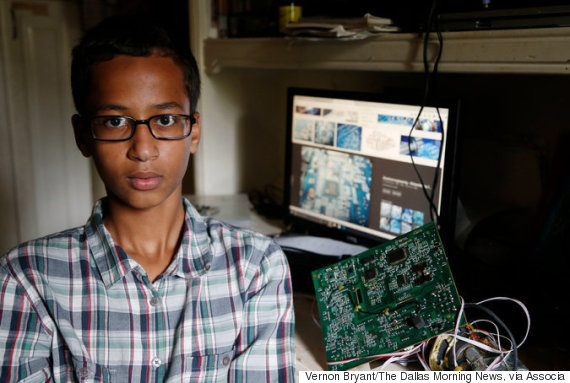
Last week, Ahmed Mohamed was suspended from school and detained by Irving County Police for bringing a homemade alarm clock to class. Police and school officials accused him of making a "hoax bomb."
The case has been litigated on Twitter ever since, with the #IStandWithAhmed hashtag trending globally. Plausible accusations of bigotry aside, one comment from the Irving police particularly stood out:
James McLellan, Irving Police Officer: "He kept maintaining it was a clock, but there was no broader explanation.... The concern was, what was this thing built for?"
McLellan's comment is an extreme example of how we often treat scientific curiosity in children. Perhaps it goes without saying (for everyone outside Irving) that 14-year-old students shouldn't need a "broader explanation" for making things. We should aspire to an education system where Ahmed's ingenuity isn't considered -- as Lesley Weaver, Irving Independent School District spokeswoman, called it -- "out of the ordinary."
I believe passionately that all children are born scientists, curious about the world. As parents and teachers, our challenge is to foster that creativity into adulthood. But according to a study in The Journal of Educational Research, we're doing a really bad job: Children are less curious and interested in science with every passing academic year.
That's why it's important that we not only #StandWithAhmed, we should actually help Ahmed -- or at least students like him -- to pursue educational and career pathways in science, technology, engineering and math (STEM).
At US2020, our mission is to dramatically increase the number of STEM professionals mentoring and teaching students through hands-on projects, with a focus on serving low-income and underrepresented communities. In July, we hosted nearly 200 community organizations and policy makers at the White House Complex for the first-ever STEM Mentoring Awards and Symposium, an event sponsored by Chevron, SanDisk and Tata Consultancy Services. The awards were a platform to build recognition for STEM mentoring as an important tool in education reform.
As Tom Kalil, Deputy Director for Policy for the White House Office of Science and Technology Policy, noted at the event: There are 16.5 million scientists, engineers and mathematicians in the U.S. workforce, meaning that STEM professionals outnumber STEM teachers by 20-to-one. What if we unlocked just a fraction of that human capital to inspire the next generation of scientists and engineers?
Research shows that quality STEM mentorship is uniquely positioned to address the primary barriers to pursuing STEM careers: the lack of exposure to STEM and the lack of connections to STEM professionals. Mentorship can also help close the persistent opportunity gap in STEM fields, since children from upper-income families are two to three times more likely to have a mentor.
For corporations, the STEM Mentoring Awards and Symposium provided practical guidelines for helping employers understand the ins and outs of work-based learning -- and how to make employee engagement successful for businesses and students alike.
For individuals, the awards highlighted the latest research and practical wisdom to help mentors thrive and endure. The awards were also a showcase for "what works" in community and corporate engagement. It's worth highlighting two of my favorite examples, winners in the "Most Innovative Hands On Project" category:
The Chicago Student Invention Convention inspires curiosity, confidence, and creative problem solving in young people through a free and flexible program. Their student inventors have made it easier to wash the family dog, improved a grandparent's walker, and designed a blue light camera to call 911 after detecting a nearby gunshot.
FirstHand, an educational initiative at the University City Science Center, brings classroom lessons to life through engaging projects and real-life lab environments. Students from under-resourced schools work alongside volunteers, scientists, and educators and learn how to build with polymers in Polymer Play, explore batteries and circuits in AmpItUp, and create DNA self-portraits through cell photo-microscopy in DNA Selfie.
On Monday, October 19, Ahmed Mohamed will join President Obama on the South Lawn of the White House for Astronomy Night. For those of us inspired to stand with Ahmed, let's also consider going one step further. Even if you don't live in Chicago or Philadelphia, it's easier than ever to find a mentorship opportunity in your community. We all have the power to help get more girls and boys engaged in science, technology, engineering and math by spending the occasional afternoon with them, whether it's to launch a rocket, write a computer program, or help them build an alarm clock of their own.